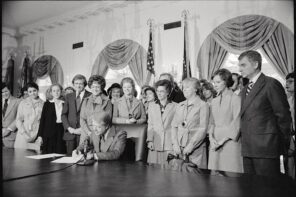There is an important cleavage in the prolife movement in America and recent developments at Focus on the Family provide a great opportunity to take a closer look.
When James Dobson left the organization just under a year ago, many wondered what his departure would mean. Focus has been one of the key promoters of religious right politics by virtue of its reach beyond the politically engaged core. Even secular radio stations have carried Dobson’s commentaries and radio show which, on the surface seemed like generic, accessible, mainstream, family-oriented Christianity, but which promoted political views that are not so mainstream, especially when it came to patriarchy, homosexuality, and abortion.
Now, in the context of an uptick in anti-abortion activism like “personhood amendments,” an announcement from presidential wannabe Mike Huckabee that he intends to make abortion his central issue, and the recent effort by Lila Rose to “expose” the “evils” of Planned Parenthood, Focus on the Family says it’s joining what might be a growing “common ground movement.” With no indication that Focus intends to stop its fight to ban abortion or halt its efforts to oppose funding of abortion alternatives, many, such as my colleague Sarah here at RD, are skeptical.
There has long been a divide in the prolife movement. One side has fought to make abortion illegal from the moment of conception; they see abortion as a threat to the family and divorced (pardon the pun) from other social issues like the death penalty or social support networks intended to insure “quality of life.” This group talks about fostering a “culture of life” but by that they are referring almost exclusively to procreation and parenting. These are Catholics and Protestants who oppose legal abortion at any stage and many oppose contraception on the ground that it fosters a culture in which children are seen as a burden and an intrusion rather than as a “blessing.” I’ve written about these folks and Sarah Palin here, and Sarah did a great “bloggingheads” video that included a discussion of them here.
While it gets a lot less attention, the other wing of anti-abortion activism considers itself to be “consistently pro-life.” They are opposed to the death penalty, in favor of anti-poverty programs, opposed to war, nuclear weapons and often even nuclear power. Several factors in American politics have kept this division hidden (the extremes tend to get the attention, media people and academics often don’t know enough about anti-abortion politics to see the cleavages etc.) but the “seamless garment” or “whole life ethic” opposition to abortion has been a part of the pro-life movement since its beginning.
These pro-lifers argue that there could be far fewer abortions if more alternatives were available. They focus on providing those alternatives in the context of networks of care instead of spending their energy on legal reforms. Last fall, as a result of President Obama’s call to find common ground on the abortion issue, they held a two-day conference at Princeton University in which they sought to develop dialogue among those with different views. (You can read more about that here and here.)
While the consistent-life-ethic prolifers have worked with the larger movement they’ve always pushed for the strategy of reducing abortions by trying to find common ground. They’ve also argued that the larger prolife movement has blood on its hands for holding to the purity of its views instead of working toward lowering the number of abortions.




